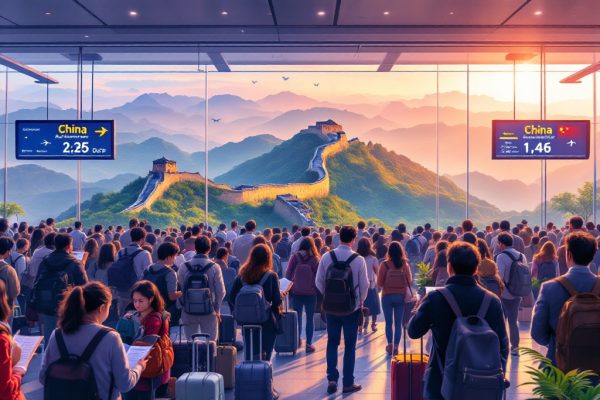Essential Travel Advice for China: What Every Traveler Should Know
Planning an unforgettable trip to China? Discover crucial visa requirements, from 10-year multiple-entry visas for U.S. citizens to 72-hour transit visas. Learn how to navigate the cashless landscape with Alipay and WeChat Pay, master transportation options like high-speed rail and subways, and embrace cultural etiquette. Unlock the secrets to a seamless and enriching China adventure – start exploring now!
Important information

- Most travelers need a visa. Ensure your passport is valid for six months past your return date. US citizens can get a 10-year, multiple-entry visa.
- China is largely cashless. Set up Alipay or WeChat Pay before you go. Carry some Chinese Yuan for places that don’t take mobile payments.
- For travel between cities, high-speed rail is efficient. Inside cities, subways are affordable. Write destinations in Chinese for taxi drivers. Use Didi for easy navigation.
- Consult a travel clinic for recommended vaccinations. Pack prescription and over-the-counter medications, verifying their legality in China. Drink bottled water and be cautious with food, particularly from street vendors.
- Learn basic Mandarin phrases. While tipping isn’t expected in restaurants or taxis, consider tipping guides and private drivers for great service.
Visa Requirements and Travel Documents for China
Planning a trip to China? You will probably need a visa, so make sure your passport is valid for at least six months after your intended departure date. You can obtain a visa from the Chinese embassy or through a travel agent. However, some nationalities are eligible for visa-free entry for up to 30 days, so check your eligibility. You can also explore visa-free transit options. For example, U.S. citizens can obtain a ten-year multiple-entry visa. If you plan to work in China, you must obtain a specific work visa. Working while on a tourist or student visa is illegal.
Obtaining a Visa for China
Planning a trip to China? A visa is essential for your journey. U.S. citizens can apply for a ten-year, multiple-entry visa, but ensure your passport has at least six months of validity and two blank pages for entry stamps. Accuracy is crucial when completing your application; double-check for any errors.
Visa Information for Your Trip
If you have a layover, a 72-hour transit visa might be sufficient. However, you’ll need confirmed travel dates, a detailed itinerary, and proof of onward travel.
You can obtain your visa from a Chinese embassy or a reputable travel agency.
Visa-Free Travel and Important Considerations
While some nationalities enjoy visa-free entry for up to 30 days, it’s recommended to check for visa-free transit policies as they may vary. Securing the correct visa is crucial, especially for work purposes.
Working on a tourist or student visa is strictly prohibited and can lead to serious consequences.
Preparing Your Travel Documents
Ensure your passport’s validity extends six months beyond your trip.
Obtain the necessary visa based on your citizenship and travel purpose.
Photocopy crucial documents such as your passport, visa, and itinerary, storing these copies separately from the originals.
Prepare a list of emergency contacts, including your embassy or consulate in China.
Review your travel insurance policy to confirm coverage in China.
Travel Planning and Preparation
Plan your China adventure two to three months in advance to secure better flight and hotel deals. This lead time allows ample opportunity to book tours, activities, and internal transportation. It also ensures sufficient time to navigate the visa process and organize your passport and travel documents.
Research and Prepare. Early preparation allows you to thoroughly research destinations, craft detailed itineraries, and familiarize yourself with local customs.
Pack Smart. Consider the typical weather and dress accordingly. Layering is always recommended, and comfortable walking shoes are a must. Remember essentials like rain gear and sunglasses.
Visa and Documents. Ensure you have sufficient time to navigate the visa process and organize your passport and travel documents.
Planning Your Trip 2-3 Months in Advance
Planning your trip two to three months in advance can often lead to significant savings on flights and accommodations. This timeframe also allows ample time for visa processing if required. Booking ahead ensures you have plenty of time to thoroughly research your itinerary and secure reservations at sought-after attractions, avoiding potential disappointment upon arrival.
Packing According to Weather Conditions
Research your destination’s typical weather before you go.
Layering your clothes is a smart packing strategy, allowing you to adapt to changing temperatures.
Pack comfortable walking shoes, essential for all the sightseeing you’ll do.
Regardless of the general forecast, pack key accessories like sunglasses and rain gear.
Check the specific forecast for your travel dates so you’re prepared for any surprises.
Health and Safety Precautions for Travelers
Before your trip to China, plan a visit to a travel clinic to ensure your routine vaccinations are up-to-date. Consider travel health insurance and medical evacuation coverage. Compile a list of local doctors and hospitals, and verify the legality of your prescription medications. Pack a sufficient supply of your medications, including any over-the-counter remedies.Regarding food and water safety, stick to bottled water and avoid uncooked food. While public handwashing is common and China prioritizes food safety and hygiene, exercise caution, especially with street food, even if cooked thoroughly.
Health and Safety Tips for Your Trip to China
Air quality can be an issue, so be aware of your surroundings. Be cautious about displaying valuables and keep your hotel doors locked. Carry copies of essential documents and your embassy’s contact information.
Personal Safety Recommendations
Familiarize yourself with local laws and customs. If traveling solo, avoid poorly lit areas and use reliable transportation. The local emergency number for police is 110.
Traveler Health: Vaccines and Health Care
Ensure your routine vaccinations are up-to-date. Consult your doctor or a travel clinic about recommended travel vaccines, such as Hepatitis A and B, typhoid, and Japanese encephalitis.
Prepare a well-stocked travel health kit with necessary medications. Compile a list of local hospitals at your destination.
Confirm that your prescription medications are legal in China and pack a sufficient supply for your entire trip.
Review your health insurance policy to determine if it provides international coverage. If not, consider purchasing travel health insurance, including medical evacuation coverage.
If you experience any illness after returning home, consult a doctor and inform them about your recent travels to China. This will assist them in accurately diagnosing and treating your condition.
Food and Water Safety
For safe drinking and oral hygiene, stick to bottled water, as tap water is unsafe. Select cooked, hot meals and avoid street vendors to minimize health risks. Frequent handwashing and sanitizer use are essential. Steer clear of raw or undercooked food to stay healthy. For added safety, consider carrying a basic first-aid kit with essentials like bandages, antiseptic wipes, and pain relievers.
Air Quality and Personal Security
Air pollution can be a concern in certain Chinese cities, so it’s wise to check air quality reports before and during your travels.
Consider packing an N95 mask to minimize your exposure to pollutants.
Petty theft does occur, so safeguard your belongings, particularly in crowded areas.
For your safety, avoid walking alone at night in poorly lit locations and be vigilant about tourist scams.
Should you experience any harassment or robbery, report the incident to the local police.
Emergency Services and Safety
In case of emergencies, use the following numbers:
- 110 for police,
- 120 for an ambulance,
- 119 for fire services.
Be aware that English-speaking operators might not always be available, especially in less populated areas.
Travel insurance is highly recommended. It is crucial for managing medical emergencies, evacuations, and lost luggage, ensuring coverage for both medical expenses and repatriation. Be cautious of potential scams to stay safe.
Emergency Numbers and Medical Help
In case of a medical emergency in China, dial 120 for an ambulance.
For police assistance, the number to call is 110.
Many major cities have international hospitals that often cater to foreign visitors.
For less urgent medical needs, your hotel can assist you by recommending local doctors or clinics.
Travel Insurance and Emergency Services
Safeguard your trip with travel insurance, protecting yourself from unforeseen medical expenses, emergency evacuations, and lost luggage. Before embarking on your journey to China, familiarize yourself with local emergency numbers and procedures. Registering with your embassy or consulate upon arrival offers invaluable support during a crisis. Here’s a step-by-step guide to ensure a safe and worry-free trip:
Secure Comprehensive Travel Insurance. Protect yourself from unexpected medical costs, emergency evacuations, and lost luggage.
Know the Local Emergency Procedures. Familiarize yourself with local emergency numbers and procedures in China.
Register with Your Embassy/Consulate. Upon arrival, register with your embassy or consulate to ensure access to support during a crisis.
Navigating Payment Methods in China
China’s payment system is largely cashless, with mobile payment apps like Alipay and WeChat Pay being the most popular. It’s recommended to set up these accounts before your trip.
Connecting a credit card to WeChat Pay is easy. While some places accept credit cards, they are not as widely used as mobile payments.
It’s still a good idea to have some Chinese Yuan on hand. ATMs are a reliable backup for situations where mobile payments aren’t accepted.
Be prepared for a mostly digital payment experience.
Cashless Economy: Alipay and WeChat Pay
Alipay and WeChat Pay are the dominant mobile payment platforms in China. WeChat Pay is especially easy to set up, usually only needing a linked credit card. This simple setup makes purchasing convenient, streamlining the shopping and dining experience throughout China.
Transportation Options in China
China offers diverse transportation options. For efficient intercity travel, the high-speed rail network connects major cities. Within urban areas, subways provide affordable and convenient transportation. Taxis are readily available, but having your destination written in Chinese is helpful. Transportation apps simplify navigation. Buses are another popular choice for city travel. While domestic flights are available for longer trips, high-speed rail is often faster and more convenient, especially for shorter distances, and offers scenic views of the countryside.
Getting Around Cities
- Subways: Convenient and affordable for navigating urban areas.
- Taxis: Readily available, but having your destination in Chinese is recommended.
- Buses: A popular option for city travel.
- Transportation Apps: Simplify navigation within cities.
Intercity Travel
- High-Speed Rail: Efficiently connects major cities, often faster and more scenic than flying for shorter distances.
- Domestic Flights: Available for longer journeys.
Using High-Speed Rail, Subway, and Taxi Services
China offers a variety of transportation options for travelers. For long-distance travel, the high-speed rail network connects major cities, allowing for quick and efficient journeys. Within cities, subway systems provide affordable and convenient commuting. Taxis are readily available, but it’s helpful to have your destination written in Chinese to avoid communication barriers. Transportation apps like Didi simplify navigation and often include translation features, making travel even easier. Didi is particularly useful for navigating within cities and overcoming language barriers. The high-speed rail network offers efficient travel between major cities.
Getting Around in China
Traveling long distances? China’s high-speed rail network efficiently connects major cities.
Need to get around within a city? Affordable and convenient subway systems are readily available.
Helpful Tips for Travelers
Taking a taxi? Have your destination written in Chinese to ensure clear communication with drivers.
Want to simplify navigation? Use transportation apps like Didi, which often include helpful translation features.
Cultural Etiquette and Local Customs
Traveling to China? Here’s a quick guide to etiquette and cultural norms:
Greetings and Gifts
Greet people with a simple “nǐ hǎo” (hello). Skip tipping at restaurants, but consider tipping private tour guides. When shopping at local markets, bargaining is customary. Tea, silk, or calligraphy scrolls make excellent gifts. Present and receive gifts with both hands.
Respectful Interactions
Avoid pointing with your index finger. Dress modestly when visiting temples. Refrain from touching people’s heads. Always ask permission before taking photos.
While English signage is becoming more common, learning some basic Mandarin demonstrates respect and can be invaluable, especially in rural areas and when interacting with older generations.
Understanding Local Traditions and Tipping
Tipping in mainland China isn’t customary in restaurants or taxis. However, it’s becoming more common to tip tour guides and private drivers for exceptional service. A suitable tip for guides is typically $5-$10 per day. For drivers, a similar or slightly smaller amount is appropriate. While tipping might be more prevalent in upscale or Westernized establishments, it’s generally best to reserve tips for truly outstanding service. A discreetly offered tip shows appreciation, but demanding one is never acceptable.
The Benefits of Knowing Mandarin
Knowing some Mandarin can be really helpful when you’re traveling in China, especially in areas outside the big cities where English isn’t common. Even a little bit of the language can make your everyday experiences more meaningful and show respect for the local culture, helping you connect with the people you meet. Convenient language learning apps are great tools for picking up these useful skills before your trip.
















